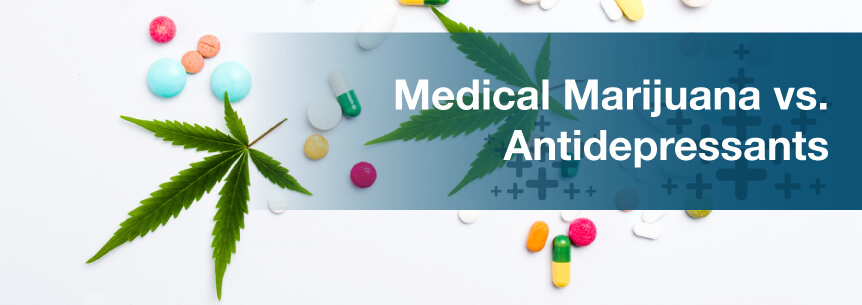
In 1996, California voters passed Proposition 215, which permitted the use of marijuana for medicinal purposes. As the years progressed, lawmakers in other states began to pass laws regulating the use of medical marijuana for the treatment of various health conditions. To date, more than half of U.S. states have legalized marijuana for medicinal use — and some of these states have legalized it for recreational use as well. Public support continues to grow, as an overwhelming majority agree with the federal legalization of medical marijuana.
Marijuana for medicinal use is not a new phenomenon. In fact, people have been using cannabis in medical applications for at least 3,000 years. Numerous studies, conducted both domestically and internationally, are continuing to accumulate data that demonstrates ways in which cannabis can be a successful treatment option for physical, cognitive and psychological health conditions. Unfortunately, the U.S. Food and Drug Administration has not determined medical marijuana is a safe or effective treatment option for any health condition.
However, the FDA has conducted some clinical trials that have led to the approval of two approved medications that contain cannabinoids as ingredients. While they have not yet completed enough research supporting the use of the marijuana plant as a viable treatment option that provides more benefits than health risks, other research exists to support the belief that the many forms of cannabis can be effective in treating a myriad of health conditions without negatively impacting the user’s health.
Cannabis has a long history of medicinal use. Believed to be first used as an herbal medicine in Asia, the hemp plant then made its way to Europe and Africa, eventually arriving in the Americas during the Colonial period. During the early 1800s, physicians discovered cannabis extracts could be effective pain relievers for those suffering from cholera. By the end of the century, pharmacies throughout the United States and Europe were selling these extracts to treat various health conditions.
The illegalization of marijuana began in the 1930s, when the Marijuana Tax Act became federal law. This law essentially criminalized all forms of marijuana except marijuana used in industrial applications. The Controlled Substances Act, passed in 1970, repealed the Marijuana Tax Act and instead classified marijuana as a Schedule I drug. Marijuana continued to be a prohibited substance until California passed the Compassionate Use Act of 1996, which made medical marijuana legal to prescribe to those with severe or chronic health conditions.
Although it is still awaiting federal approval by the Food & Drug Administration, more than half of the United States have legalized marijuana for medicinal use. Despite this agency’s position on medical marijuana, research conducted on a global scale has found that chemical compounds derived from the cannabis plant can positively impact the body in a significant way by offering relief for those with various health conditions. Patients living with a vast number of psychological, cognitive and physical afflictions have claimed marijuana is an effective treatment option.
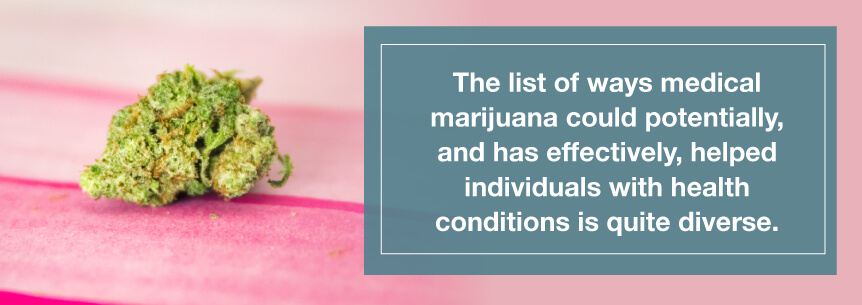
The list of ways medical marijuana could potentially, and has effectively, helped individuals with health conditions is quite diverse. Chronic pain management is one of the most common ways to use medical marijuana. Sufferers with conditions like multiple sclerosis, Parkinson’s disease, fibromyalgia, irritable bowel syndrome and Crohn’s disease have found relief with marijuana. Others use it for the management of muscle spasms, glaucoma and seizures. There’s even a chance the chemicals in marijuana can slow or shrink tumor growth. The number of ailments medical marijuana could treat is truly impressive.
An estimated one-quarter of individuals throughout the world will face a mental or neurological disorder during their lives. Nearly 44 million people in the United States experience some form of mental illness — and more than 16 million of that group faces depression. As rates of depression seem to increase across demographics, it’s important these individuals have treatment options available to help them successfully manage this disease. Although antidepressants are common treatment options, medical marijuana may be a viable alternative for those with depressive disorders.
Though it is one of the most common mental health disorders in the country, depression is more than merely feeling sad. Clinical depression and major depressive disorders affect the individual on cognitive, psychological and physical levels. Like many other psychological disorders, we should view depression as a disease that encompasses a spectrum of causes and symptoms. Risk factors like a family history of depression, physical illnesses, medications and major trauma or stress can influence or advance the onset of a depressive episode.
To receive a depression diagnosis, an individual must have one or more of the following symptoms for at least two weeks:
Never ignore the symptoms of depression. Though depression is a common disorder for men, women and youth from all walks of life, it is a serious mental health issue that deserves the same attention and treatment any other chronic illness would receive. No lone catalyst leads to suicide. However, mental health disorders like depression could be significant factors. To begin to understand depression, one must acknowledge that depression is not as easy to define as an illness like the flu.
Depression is a complex disease. Because it doesn’t always display readily apparent symptoms, it is much easier to hide than some other illnesses. Among adolescents and adults, it is the leading cause of disability in the country — however, most remain untreated. Here are some depression diagnoses:
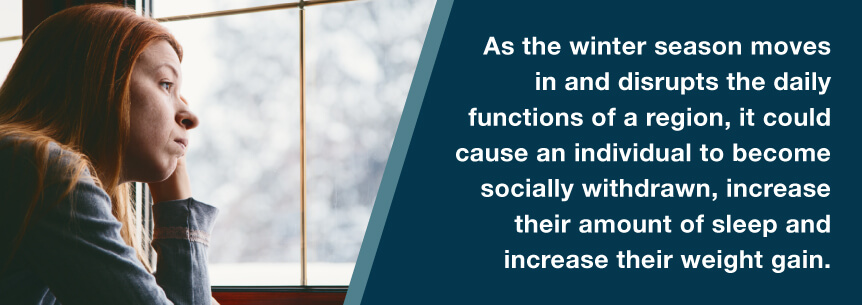
Other types of depression could take the following forms.
Depression is not a curable disease. However, people can effectively manage their symptoms through the use of treatment options targeted to their specific physical, emotional and cognitive needs. Common types of treatment options include therapies and medications, either alone or in conjunction with one another. Though antidepressants are the most common prescription, many people are curious if medical marijuana could be an effective alternative for managing their depression symptoms. To determine which offers the maximum potential benefit with the minimal drawbacks, we must objectively compare them using current research.
When comparing medical marijuana and antidepressants, we must consider certain factors. First, we should acknowledge the data supporting the effectiveness of each remedy, along with taking both their benefits and possible side effects into account. One side effect that deserves individual attention is the potential for addiction development when using these substances. Finally, we should discuss the availability of the drug and the legalities surrounding its use.
Many different medications can treat depression. Because each sufferer has a unique disease, physicians will often begin by prescribing the antidepressant they believe has the most effective results. Although one medication may work well consistently for one patient, a different patient may find another medication is more effective. Some antidepressants can yield positive results in as little as a week, while others may take up to eight weeks to lessen symptoms. The majority of people notice a decrease in their symptoms while on an antidepressant.
Medical researchers have conducted studies to test the effectiveness of antidepressants and compare results to patients using placebos. The findings suggest all antidepressants are more effective in reducing symptoms than placebos, though some medications are more effective than others. It’s important to note nearly one-third of those with depression do not receive relief from antidepressants, and these drugs are generally more effective for those with chronic, moderate or severe depression. Antidepressants can be useful treatment options. However, there is no guarantee of their effectiveness.
Hundreds of chemical compounds within the cannabis plant could potentially treat symptoms of depression. One study found strains with higher potencies of CBD and THC reduced depression symptoms in nearly 90 percent of users. Unfortunately, these types of studies comprise a small amount of research on the short- and long-term impact of medical marijuana on depression. As doctors integrate medical marijuana into their treatment plans, we will have access to more data addressing marijuana’s influence on depression.
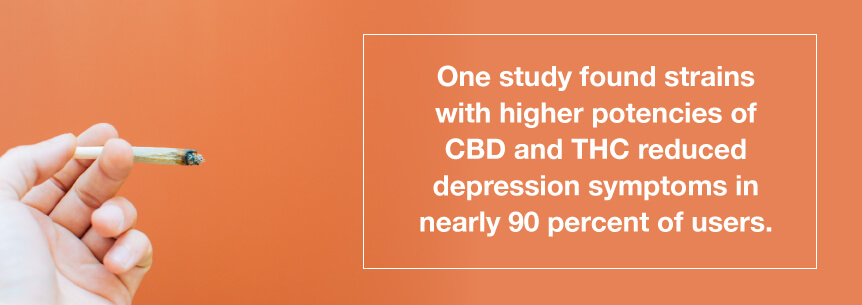
However, the lack of research doesn’t mean marijuana can’t be a treatment option. Many believe cannabis does influence the endocannabinoid system, which affects the functions depression can influence. That leads to the possibility that cannabinoids activate CB receptors, it could result in a decrease of depressive symptoms. Researchers are currently developing synthetic cannabinomimetic drugs to attempt to treat depression successfully. With further study, it’s possible findings will show marijuana can help patients manage their depression symptoms.
Antidepressants are some of the most widely prescribed medications throughout the world, but that does not mean they cannot cause some individuals varying degrees of harm. All medications carry a risk, and antidepressants are no different. Some SSRIs can cause a person to experience physical symptoms, including pain, gastrointestinal discomfort, insomnia and blood clotting. SSRIs could also impact sex drive, causing a diminished interest in sex and delayed orgasms. There is also a possibility these drugs could potentially influence suicide.
As the medical marijuana industry continues to grow, research is bringing to light new information regarding the general effects the cannabis plant has on the body, and how marijuana may benefit specific health conditions. Currently, very little research details the different forms of cannabis, the ways to ingest it and its reactiveness to various health conditions. On a broad scale, some common side effects reported include dizziness, dry mouth, impaired cognitive functioning and heart or blood pressure problems.
There is a debate regarding whether antidepressants are addictive. Some research states they will not lead to abuse or dependency. Conflicting research states some antidepressants have the potential to be abused, especially by those with a history of abusing other substances. Other studies report those who have been on antidepressants for long-term depression management face symptoms of withdrawal when attempting to stop usage — others claimed to feel addicted to the drug. Though it is still in question, use all synthetic substances with caution.
Government agencies state the abuse of marijuana could lead to a marijuana disorder, which, in turn, can lead to addiction. Research suggests as many as 17 percent of users will become dependent on marijuana — however, dependency and addiction are not interchangeable terms.
It’s also crucial to note that more than 20 percent of prescription drug users have used them nonmedically at least once. Drug overdoses are the leading cause of accidental death in the United States. The current opioid epidemic, which includes addiction to prescription pain relievers, is dramatically accelerating this rate. Despite the suggested addition, the DEA has not received any reports on death by marijuana overdose.
Antidepressants are not on the Drug Enforcement Agency’s drug schedule. There has been an exponential increase in the use of antidepressants over the last 30 years. Some authoritative sources report most adults have easy access to antidepressants. Many individuals may receive medication for their mental health issue without a thorough evaluation by a mental health professional. Many taking these substances also do not regularly see a therapist. The availability and acceptability of these drugs render them a popular treatment option for depression.
Currently, the DEA considers all forms of marijuana to be Schedule I drugs. Only those living in a state in which medical marijuana is legal can have a prescription for these substances. However, each of these states has a different list of qualifying health conditions for which physicians can prescribe medical marijuana. Even if depression is not one of these qualifying conditions, it could theoretically become one if the doctor and the state’s department of health agree the patient would benefit from this treatment option.
The growing prevalence of medical marijuana is encouraging individuals with health conditions to consider cannabis as an alternative treatment option. While few states have already categorized some psychological disorders as qualifying conditions for medicinal marijuana use, others have not yet formally added diseases like anxiety, PTSD or depression to their lists. Regardless, interest continues to increase on the effectiveness of medical marijuana on mental health illnesses, specifically depression.
In the debate over medical marijuana vs. antidepressants, neither is a clear victor. Since there is such scant research on the effects of various cannabis strains in specific medicinal applications, there is currently no indisputable evidence or federal support for medical marijuana to be a safe and effective treatment for depression. Though researchers anticipate these compounds will yield beneficial results with limited side effects, it will take more conclusive study to know for sure.
Antidepressants are legally available as a treatment option for depression, and numerous independent and governmental studies show many antidepressants can be effective in treating this mental affliction. However, there is also data stating no antidepressant can guarantee success, and that some may cause adverse side effects that could be fatal.
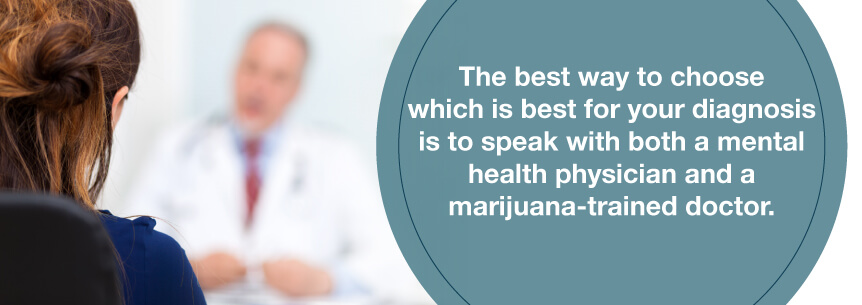
Currently, there is no way to determine whether antidepressants or medical marijuana is the better treatment option for depression. The best way to choose which is best for your diagnosis is to speak with both a mental health physician and a marijuana-trained doctor. These professionals can assess your specific depressive symptoms, weigh the potential benefits and drawbacks and help you decide which they’d feel would be the safest and most effective treatment option for your condition.
To learn more about medical marijuana’s impact on depression, sign up for our newsletter or get in touch with a marijuana doctor or local dispensary in your area.
No Information on MarijuanaDoctors.Com should be used to diagnose, treat, prevent or cure any disease or condition. You can view our Full Disclaimer here.